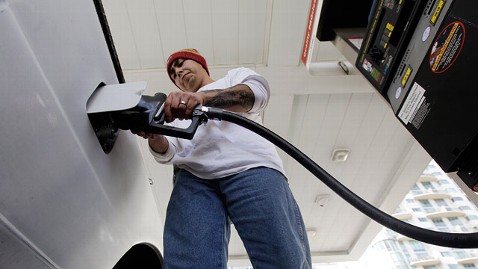Gas Prices Take Less of a Toll; Let's See What $4.00 Does

Image: Jose Sanchez / AP Photo
With gasoline nudging $4.00 a gallon, a new ABC News/Washington Post poll finds that the price at the pump is taking a toll on Americans' pocketbooks - but so far with less pain and fewer political recriminations than in past episodes of gas-price run-ups.
The question: Whether the $4 mark changes all that.
Sixty-two percent in this national survey report financial hardship as a result of higher gas prices; about half that number, 33 percent, say it's serious hardship. Both are well below their levels - 77 percent hardship, 51 percent serious - at their peak in ABC/Post polls, in June 2008.
Unknown is whether the public is doing more to adjust now, or whether $4 represents a psychological barrier beyond which all bets are off. Regular unleaded averages $3.94 a gallon nationwide in U.S. Department of Energy data released today; it didn't rise for the first time since mid-January. That compares with $4.08 - or $4.31 in today's dollars - when self-reported financial hardship peaked in mid-2008.
The political blame also is lower than in some past experiences. Given a list of possible culprits, 21 percent of Americans blame the Obama administration for rising gas prices, vs. a peak, in available data, of 34 percent who blamed the Bush White House for gas prices in March 2005.
More than half in this poll, produced for ABC by Langer Research Associates, instead blame either the U.S. oil companies or foreign oil-producing countries (28 and 25 percent, respectively).
Not blaming Obama directly, of course, isn't the same as liking how he's handling the situation. A broad 62 percent of Americans disapprove of the president's performance on gasoline prices, useful fodder for his GOP adversaries in the election contest ahead. Fifty percent disapprove "strongly," an unusual level of strong disapproval on any issue.
A near-unanimous 90 percent of Republicans disapprove of the president's work on the gas-price situation, as do nearly two-thirds of independents, 64 percent. Democrats cut him much more slack: Thirty-seven percent disapprove, while 54 percent approve.
INCOME and PARTISANSHIP - Hardship induced by gas prices, naturally, is highly income-dependent. From 40 percent among people with household incomes more than $100,000 a year, it jumps to 67 percent among all those who are less well-off. "Serious hardship," 14 percent among $100,000-plus earners, reaches 43 percent among those with incomes of $50,000 or less.
In another economic comparison, financial hardship is reported by roughly equal numbers - more than three-quarters - of people who describe themselves either as working class, or as middle class but struggling. That dives to 46 percent of those who say they're comfortably middle class or moving up, and 37 percent of those who are better off than that.
But political sentiment also influences assessments of gas-price pain, with people who are more critical of the Obama administration also more apt to report hardship, presumably as a way of expressing their broader discontent with the status quo. Regardless of income, reports of financial hardship because of gas prices are 14 points higher among Republicans and Republican-leaning independents vs. their Democratic counterparts and 19 points higher among very conservative Americans than among liberals.
Blame, of course, is more overtly political: Forty-nine percent of very conservatives, and 41 percent of Republicans and Republican-leaning independents, chiefly blame the Obama administration for the recent rise in gas prices. Among leaned Democrats and liberals alike, just 7 percent agree.
Check back for more on this ABC/Post poll tomorrow morning…
METHODOLOGY - This ABC News/Washington Post poll was conducted by telephone April 5-8, 2012, among a random national sample of 1,003 adults, including landline and cell-phone-only respondents. Results have a margin of sampling error of 4 points for the full sample. The survey was produced for ABC News by Langer Research Associates of New York, N.Y., with sampling, data collection and tabulation by Abt-SRBI of New York, N.Y.